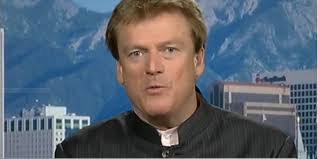Three years ago, Deep Capture reporter and Overstock CEO Patrick Byrne gave a famous conference call that he titled, “The Miscreant’s Ball.” His thesis was simple: Some short-selling hedge funds collude to destroy public companies by spreading misinformation, orchestrating government witch hunts, filing bogus class-action lawsuits, and, most egregiously, selling billions of dollars worth of phantom stock.
In the months that followed “The Miscreants Ball” presentation, a clique of journalists with close ties to short-selling hedge funds and CNBC’s Jim Cramer (himself a former hedge fund manager), set out to sully the reputations of Patrick and everyone else who sought to expose short-seller crimes.
Cramer pal Joe Nocera, who is the New York Times’ top business columnist, wrote that Patrick’s crusade against hedge funds that sell phantom stock was “loony beyond belief.” CNBC contributor and Marketwatch columnist Herb Greenberg, formerly an editor with Cramer’s web publication, TheStreet.com, labeled Patrick the “worst CEO in America” for taking on the shorts (ie., the same shorts who are now paying Herb for “independent” financial research). Fortune magazine’s Bethany McLean, who has yet to write a story that was not sourced from a small group of short-sellers connected to Jim Cramer, suggested in an article titled “Phantom Menace” that Patrick should be fired from Overstock for speaking out against the problem of phantom stock.
At the time, I was the editor of the Columbia Journalism Review’s online critique of business journalism. The attack on Patrick was like nothing I’d seen before, so I decided to write a story about the media’s coverage of short-sellers and phantom stock. When Herb Greenberg and Joe Nocera got word of this, they both called my editor demanding that he kill the story. Cramer sent a public relations goon to delay the story. Then a short-selling hedge fund, Kingsford Capital, appeared in my offices and offered to pay my salary.
My successor at the Columbia Journalism Review is now called “The Kingsford Capital Fellow.” One of Kingsford Capital’s managers was a founding editor of Cramer’s website, TheStreet.com. I do not believe that Kingsford’s interest in the Columbia Journalism Review is philanthropic. And I do not believe that the Columbia Journalism Review, “the nation’s premier media monitor” is capable of objectively monitoring the financial media so long as it’s chief writer on the subject is paid directly by this very controversial, Cramer-connected, short-selling hedge fund.
Perhaps facing similar pressures, or perhaps because they are unwilling to contradict Cramer’s influential Media Mob, or maybe because they’re just plain lazy, other journalists have shied away from covering the problem of illegal short-selling. Instead, reporters have incessantly repeated the party line that “short selling is good for the market. Only bad CEOs complain about short-sellers.”
In March, short-sellers destroyed Bear Stearns by spreading false information and selling millions of phantom shares. And now the shorts are going after another major investment bank. In a week of high drama, hedge funds have been circulating blatantly false and hugely damaging rumors that big institutions are pulling their money out of Lehman Brothers. If March SEC data is any indication, the shorts are also selling millions of dollars worth of phantom Lehman stock.
One of the nation’s most important investment banks is down, and another is on the brink. The American financial system wobbles.
And, suddenly, Cramer’s Media Mob is silent. Gone is all of the talk about Patrick Byrne being crazy. Nocera says nothing about the attacks on Lehman and Bear. Bethany McLean recently wrote a favorable review of a book written by David Einhorn, the most prominent short-seller of Bear Stearns and Lehman, but she dares not mention the current market predations.
Herb Greenberg, who used to sing the praises of short-sellers almost weekly, was last heard defending his hedge fund friends in April. CNBC seems to have taken him off that beat. (The network recently dispatched Herb to the San Diego County Fair, where he interviewed a vendor of deep-fried Twinkies).
But Jim Cramer is talking. No doubt to distance himself from the growing scandal, he went on CNBC today and said precisely what Patrick Byrne said three years ago. Noting that short-sellers are colluding to take down Lehman, he said the problem is “the need to be able to get a borrow and see if you can find stock….. no one is even calling to see if they can get a borrow. [In other words, hedge funds are selling stock they don’t have — phantom stock]. It’s kind of like, well listen, let’s just knock it down. It’s very similar to what Joe Kennedy would have done in 1929 [leading to Black Monday and the Great Depression] which is get a couple of cronies together and let’s take it down…”
Too late, Jim. For three years, you, CNBC, and a clique of journalists very close to you have ignored this crime because your short-selling hedge fund cronies claimed that phantom stock is not a problem. Meanwhile, hundreds of companies have been affected. Billions of dollars of value have been wiped out. And lives have been destroyed.
It is one of the most ignominious episodes in the history of American journalism.
Click here to enter the $75,000 “Crack the Cover-up” contest.





as burell rightly points out America has been asleep at the switch for the last century. It is atragic story of deep seated corruption and proves that all economic models including capitalism are fundamentally flawed not because of their theoretical mechanics but by the power hungry pricks that run the system and the sheep who put up with it. Part of me applauds those currently trying to expose the corrupt system and part of me knows it is far too late. USA is fundamentally broken and it looks like it will take the globe with it. Like all empires the time has come to fall. Those who think they can continually dodge the judgement bullet are sadly mistaken.
who runs cnbc? when will he or she answer this storm of criticism about cramer and cnbc?
Decimal Place Trading caused the recession of 2008
This recession was caused by the manipulation of stock prices on Wall Street through naked short-selling, flash trading, high-frequency trading, secret software, super-fast computers and what I feel was the main cause of this corruption: “Decimal Place Trading.” As I write this article today, much of this corruption is now slowly coming out through social media outlets such as Twitter and Facebook, along with bloggers on the internet, Yahoo bulletin boards, and the movie Stock Shock. The news media is also to blame for what has taken place in this country — including the near-collapse of Wall Street and the banking industry.
There are many things to point fingers at or place the blame on, and I can think of a few off-hand that I would like to cover — the first being Wall Street’s regulation changes. I am no expert — I am not even a writer — but decided to tell this story since the business news media was not telling it. These Wall Street regulation changes contributed to the aforementioned problems in many ways, with the first being the removal of fractions in stock pricing. On January 29, 2001, the New York Stock Exchange, or NYSE, went to four-decimal-place trading. On March 12, 2001, the National Association of Securities Dealers Automated Quotation, or NASDAQ, followed suit. This new rule had the best of intentions as we headed toward the computer and digital world, but over time it was manipulated and companies like Goldman Sachs figured out how to take advantage of the new system. I am not sure how it happened, whether it was lobbied for years or what — but along came the biggest mistake of all with the elimination of the uptick rule in July of 2007. This rule had been implemented after the great depression, and had been in place since 1938. How could the Securities and Exchange Commission, or SEC, abolish a rule that had been in place for close to 70 years, and had worked? Put these two changes together, and you get a simple equation: greed plus corruption equals recession.
Reports have been released on the web that Goldman Sachs made over 100 million dollars per day in 46 out of 64 trading days in Fiscal Year 2009, second quarter (April, May and June). Let me say that again. They made over 100 million dollars per day, and are still doing it as I write this letter today. But the question remains, how did they do it? There has been no report of this by any of the news media. How can this be? This corruption is 100 times the gravity of the Bernie Madoff story, and yet there has been no coverage by CNBC or Bloomberg News. Why? Goldman Sachs, upon Wall Street transitioning to fractions and the abolishment of the uptick rule, designed secret software and used this software to gain an advantage on every potential investor. Basically, Goldman Sachs became a Las Vegas poker dealer in New York City on Wall Street, turning profits on investors every trade with their super-fast computers and software.
Richard Keane August 26th, 2009 Revised version
http://www.twitter.com/stockshockmovie
Pretty nice post. I simply stumbled upon your weblog and wished to
mention that I have truly enjoyed browsing your weblog posts.
In any case I’ll be subscribing to your feed and I hope you write once more soon!
Look into my webpage; Resume Writing Tips 2012
Einstein received the Nobel Prize for his work with streams of light quanta (packets of light)
however he was not aware of the revolution that would follow (3).
They give you a temper of the will, a quality of the imagination, a vigor
of the emotions, a freshness of the deep springs of life, a tempermental predominance of courage over timidity,
an appetite for adventure over love of ease. “What’ll you do with your pay when this is over, Carlson.
Have a look at my blog post :: big fish casino hack (http://www.decorationgo.com)